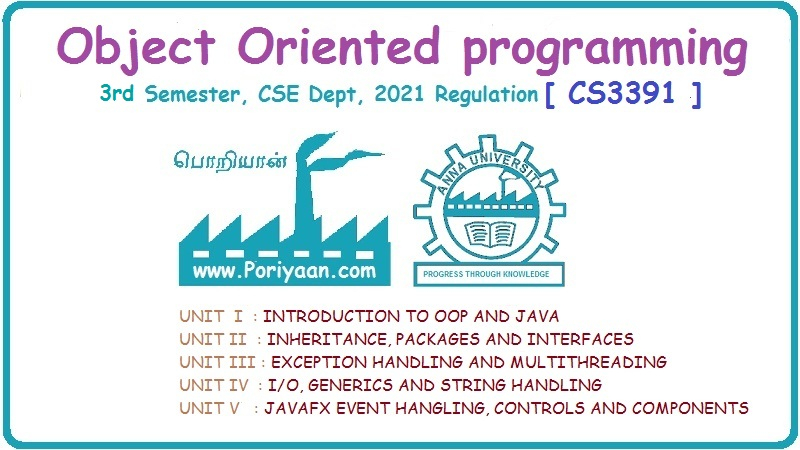Object Oriented Programming: Unit I: Introduction to OOP and Java
JavaDoc Comments
Syntax with Example Java Programs
Javadoc is a convenient, standard way to document your Java code. Javadoc is actually a special format of comments. There are some utilities that read the comments, and then generate HTML document based on the comments.
JavaDoc Comments
Javadoc
is a convenient, standard way to document your Java code. Javadoc is actually a
special format of comments. There are some utilities that read the comments,
and then generate HTML document based on the comments. HTML files give us the
convenience of hyperlinks from one document to another.
There
are two types of Javadoc comments -
• Class
level comments
• Member
level comments
The
class level comments describe the purpose of classes and member level comments
describe the purpose of members.
The Javadoc
comments start with /** and end with */ For example
/** This is a Javadoc comment statement*/
Class Level Comments
The
class level comments provide the description and purpose of the classes. For
example - /**
*@author
XYZ
* The
Employee class contains salary of each employee the organization
*/
public
class Employee
{
//Employee
class code
}
Member Level Comments
The
member level comments describe the data members, methods and constructors used in
particular class. In this type of comments special tags are used to describe
the things. The most commonly used tags are -

The
example of member level comments for the Employee class is as shown below /**
*
@author XYZ
* The
Employee class contains salary of each employee the organisation
*/
public
class Employee
{
/**
*Employee
information for knowing the salary
*/
private
int amtSalary;
/**
*The
constructor defined to initialise the salary amount
*/
public
Employee()
{
this.salary=0;
}
/**
* This
method returns the salary amount of particular employee
*@return
int
*/
public
int getAmtSalary()
{
return
salary;
}
/**
*@param
int No_of_Days_Worked is for total number of working days
* @param
int Payscale is for payment scale as per the designation of the employee
*/
public
void setAmtSalary(int No_of_Days_Worked, int Payscale)
{
this.salary=No_of_Days_Worked*
Payscale;
}
Along
with the above mentioned tags some HTML tags can also be included in Javadoc
comments. For example we can use<table><img> tags in Javadoc. Also
we can include special tags like < in the Javadoc. Some words like true,
false and null can also be included in Javadoc.
Object Oriented Programming: Unit I: Introduction to OOP and Java : Tag: : Syntax with Example Java Programs - JavaDoc Comments
Related Topics
Related Subjects
Object Oriented Programming
CS3391 3rd Semester CSE Dept | 2021 Regulation | 3rd Semester CSE Dept 2021 Regulation
